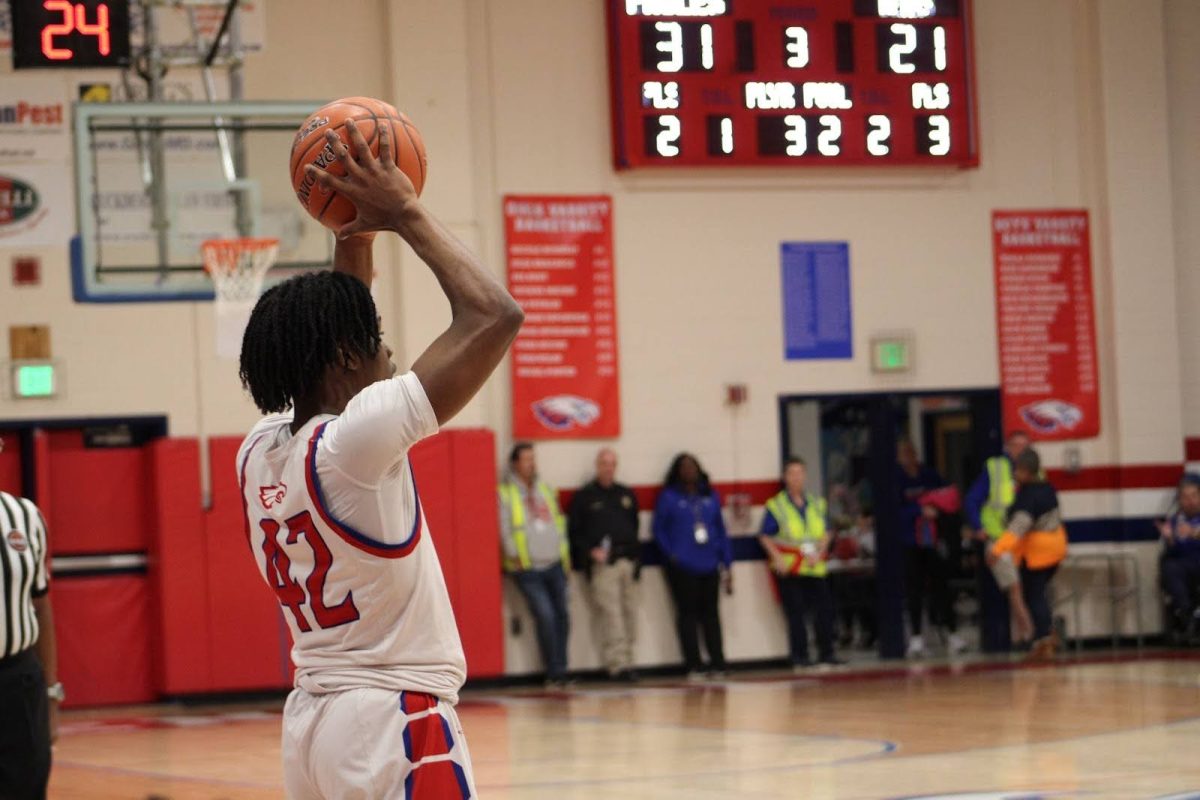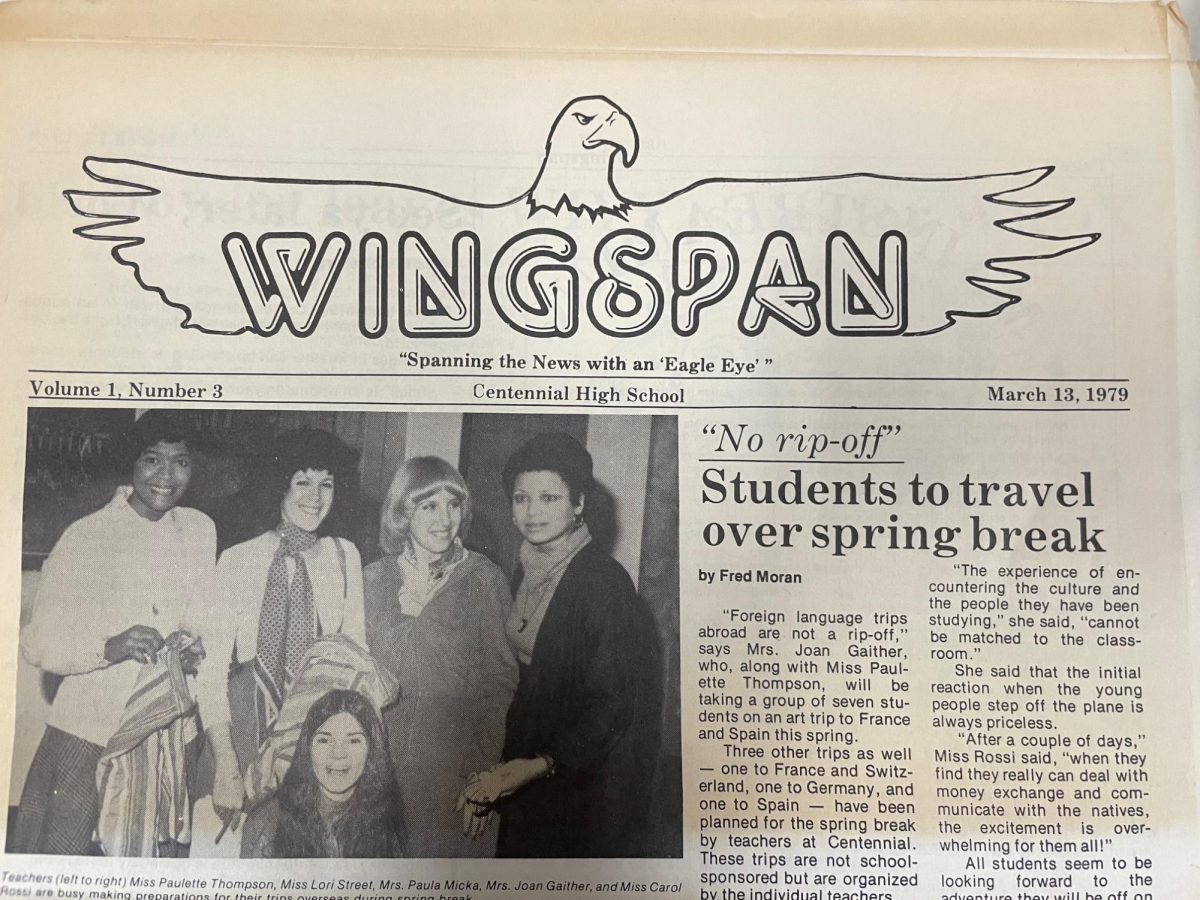On March 3, 2025 the Howard County Public School System’s newly amended policy 8080, regarding the use of cellphones, will be put in place for all Howard County schools, potentially shifting the learning dynamic entirely throughout the county. Unlike the previous policy, this new amendment completely bans the use of all cell phones, even during non-instructional time. As the date of the ban fast approaches, students and teachers alike express their outrage and hope toward a tech-less building.
The county’s previous technology policy allowed students to use personal technology when permitted for instructional purposes and during non-instructional time such as during lunch, between classes, and during special events. The new policy, however, differs tremendously as it completely prohibits the use of personal technology from the first bell at 7:50 am to the last bell at 2:35 pm. The exceptions to the ban include during emergencies or when explicitly stated in a 504 plan, IEP, and health plans. In the past, restrictions on other personal technology never existed, with the majority of the concern on cell phones, but this ban is also extended toward headphones and e-readers. New and harsher consequences will be implemented if students fail to adhere to the ban, including confiscation of the device until the last bell upon the second warning with any following incidents resulting in confiscation requiring parental retrieval and an office referral.
Director of Communication and Engagement Brian Bassett, proposed to change the current phone policy on July 11, 2024. During this time, research was collected by the Howard County Board of Education regarding the effects of phones on students. Stakeholders, such as parents, students, school and non-school based staff, were encouraged to fill out a survey considering this topic. The participants were instructed to state whether they strongly agree or disagree with given statements which included questions regarding phone usage as a distraction, for safety purposes, and whether phone use in school should be limited/banned. Almost 72% of all participants, excluding students, strongly agreed that phones were an issue that required more intense restrictions and regulation. This desire rooted from the biggest concern among the participants, which was that phones are a distraction to instruction. However, there were conflicting arguments of outlying safety concerns due to a lack of phone access.
These concerns are not new, and there has been a lot of research regarding the effects phones have on the learning of students nationwide. A Pew Research Center survey conducted in the fall of 2023 revealed that 72% of U.S. high school teachers consider student cell phone distraction a major problem in their classrooms. Similarly, according to The School Superintendents Association’s (AASA) article “A Mindshift Over Cellphones in Schools” written by Educational Consultant, Peter Stiepleman, “today’s teachers are working harder and harder just to get their students’ attention. The chief reason: Cellphones.” In addition, Stiepleman states that increased technology use has led to high rates of cyberbullying, producing declining mental health. He writes how Diego Ochoa, superintendent of the San Mateo-Foster City School District in California, authorized the ban of cellphones and has seen more positive interaction among students. However, Ochoa regrets not discussing with students before implementation as it would have encouraged better understanding. Stiepleman also addresses the potential safety concerns that go along with taking away phones by explaining that phones may actually cause more confusion than help during critical situations, ranging from increased fear to false information.
“The Anxious Generation” by Jonathan Haidt further elaborates on the need to restrict phones for students. The human mind cannot focus on two things at once, so phone use and learning don’t go hand in hand. In addition, more children develop anxiety and depression because of phones and extended time on the internet/social media. Emergency department visits for self-harm among 13-17-year-olds rose sharply between 2004 and 2017, aligning with increased smartphone usage. On this same note of mental health, the lack of human connections may explain why suicide and depression rates are surging, up 167% and 145%, respectively, for girls over the last decade, according to the CDC.
Although there is a lot of scientific evidence supporting the complete ban of phones, it is undeniable that they bring their own benefits. In an article from The Harvard Gazette “Do phones belong in schools?” written by Anna Lamb, she questions the issue of stripping away technology that has been increasingly used in recent years. Returning from the pandemic where everything was online, technology was significantly important but soon became an issue in person. However, phone bans are being abruptly enforced with over 77% of U.S. schools moving to ban cell phones for nonacademic purposes as of 2020, which changes a lot for students who have relied on them for the past 4 years. Many student groups find support and connections through online interactions and relationships, and taking that away can have serious impacts. She also explains how incorporating phones in lessons can have positive effects, teaching students how to use phones purposefully, learning tech-literacy, along with self-regulation.
Many of these views were brought up during the public hearings before the Howard County Board of Education. Lindsay Unger, who is the mother of two children in HCPSS, testified and emphasized Haidt’s book speaking directly on how smartphones fuel distraction, cyberbullying, and conflict. She also argued that phones interfere during emergency situations and they could cause network congestion. Ryan Powers, another parent of HCPSS kids, also testified in favor of the ban. He argued that “we must be the adults in the room” and understand the effect phones have on sleep habits, mental health and social deprivation. He also refuted the safety concerns arguing that in times of emergency, students need to listen to teachers for instruction and phones may hinder that.
On the opposite side, Gavin Falcon, a sophomore at Long Reach High School, testified against the ban. He highlighted that in the real world phones won’t be restricted and we should learn to build good habits during high school rather than taking away phones altogether. He also brought up the issue of direct contact between students and parents, offering his own experience when he was notified of a family member’s passing. He ended his testimony emphasizing that there are too many scenarios where phone use is necessary and the new policy can’t account for all of them.
While both sides share valid arguments for or against this new ban, these opinions have been widely given by parents and adults who are not part of the everyday school day. In-building teachers and students have much more to say on this policy, which affects them the most.
SGA president Jenny Min shares that she has mostly heard “negative comments about the phone ban, especially during lunch.” She mentions that some students emphasized that “they’re kind of used to having their phone put away just because it’s already been softly encouraged at school this past year.” As SGA president, many students have went up to her angry about this new policy, and while she is heavily involved in the student body, she expresses that “there’s nothing that I can do as the president or within SGA in general…students lacked a say in this situation and it was something that was enforced right away without anyone really knowing other than teachers, parents, and the board itself.”
This policy was mostly decided with limited student voice, and it would be very hard to sway the board of education to change their decision. Min shares that while students are able to provide testimonies and even organize walk outs, she ultimately believes “it’s going to be a lost cause.” The main issue she focuses on is the amount of scientific evidence that backs up the board’s decision, making the only way students can defend their argument is also with scientific evidence, in which they lack.
Despite her negative tone regarding the phone ban and her personal opposition to this new policy, she expresses that there are “ways that it is beneficial for phones to not be used but at the same time there are benefits of it being used for instructional purposes, it’s kind of on a tipping scale.”
Sophomore Justin Plunkett agrees that phones can be useful when it comes to forgetting chromebooks or when encountering dead devices. He agrees that the ban of phones in hallways and lunch is a little extreme and argues that “it’s gonna be hard for teachers to enforce that because every teacher has to keep track of students in the hallway and telling them to put it away.” Overall, he doesn’t think the ban is entirely bad.
“Some kids can’t go the day without their phone,” said Plunkett, who added that this ban could even potentially encourage socialization.
Juniors also seem to have the same opinion. Andrew Baynes and Sashwat Tulshyan both agree that the ban is far too strict, but they differ in their support for it. Baynes argues that the ban is “not really preparing you for college, and it kind of ties back to what I was saying earlier about how it’s on you as a student.”
Tulshayan pushes back stating that the ban would “inherently promote good habits, which would then, if enforced long enough, become real habits, which would then prepare you better [for college].” Despite their differing arguments, Plunkett, Baynes, and Tulshayan agree that the ban stretches too far by not allowing phone use during lunch and in the hallways, along with its difficulty in keeping that part enforced and regulated.
Many seniors, though only a couple months out from graduating, also strongly disagree with the phone policy, but for some reasons that differ from underclassmen. Senior Caden Maynard has concerns regarding the potential safety risks and barriers in communication that come with the cell phone ban.
“A lot of things can happen in a 7-hour span. Loved ones can pass, someone could not have a ride home, a parent could be stuck at work, traffic, and the phone is a way to communicate through long distance, which sometimes isn’t possible when you have just your chromebook.”
Maynard also brings up how he uses his phone to communicate with his boss, as he leaves mid-way through the day for work release. “A lot of times I’m texting my boss and checking the time to make sure I get to my shift on time.” He is concerned that the phone ban will limit his communication with people he needs to be in contact with, and cause more problems and confusion.
One of the more intriguing aspects of this policy is how the teachers view it and plan to enforce it in their own classroom environment. Under the current policy, phone regulation ranges from class to class, with some teachers being more lenient and determining phone usage on a case-by-case basis, while some are much more cut and dry with their strictness surrounding phones.
Robert Astri, a chemistry teacher at Centennial for 33 years, has his own views on the new phone ban, but ultimately thinks it is the right decision to be made. Although he doesn’t view phones as a problem in his classroom, he understands that isn’t the case in every class.
“My classes, the kids were very reasonable, I very seldom had to say anything to anybody where they were abusing the privilege but I also understand that I’m very fortunate. Probably generally speaking it’s necessary because I think that the majority of kids are incredibly undisciplined.”
While he doesn’t oppose the ban, Astri leans towards the side of treating phone usage depending on circumstance and teacher discretion. He thinks it shouldn’t be “black and white,” but more flexible based on the situation. However, that ideal is no longer made possible due to the problem becoming overwhelming.
“What caused this rule to come into play is abuse. I understand why the rule is there because in most places it is abused,” said Astri.
Katherine Parker, a psychology and history teacher at Centennial for 10 years, strongly opposes the new policy and feels a plethora of emotions, including “frustration, anxiousness, concern, and fear.” While she understands the problem surrounding phones in the classroom, Parker believes that the policy is “not based on the reality of the world we live in, not based on good research, and not well planned.”
While she currently has problems with phone usage in her classes, she feels that the complete ban of phones removes the discussion and educational piece surrounding self-restriction and control with phones.
“The other thing I do that is going to be missed in the ban is I’m also trying to educate,” said Parker. “The reason that you have to put it away is because it’s not helping you accomplish anything, it’s distracting you.”
Parker emphasizes that it should be the teacher’s job to help students learn how to self-regulate. With the complete ban of phones, it doesn’t teach students to manage their own phone use, an important skill in future opportunities. She also points to the fact that students will have some level of distraction whether it is their phones or not.
“You’re going to be distracted and you’re going to have daydreams, and I’ve had students distracted by a bottle of lotion or a can of mints. Distractions are going to happen and I think it is my job to entertain and engage you,” said Parker. “Sometimes what I have to do isn’t going to entertain you and you are going to find yourself thinking about the game after school, and that’s just the fight I’m always going to have as a teacher.”
Something that both Astri and Parker had to offer was that phones can be a very valuable resource and tool in the classroom for certain aspects, so banning them completely restricts using phones for those types of things.
Astri refers to the convenience of phones being able to do the same things that the school-provided Chromebooks can do. “The student in my class using her phone for her work was just as productive. There’s times where students need to use calculators and I don’t have enough so I just let them use their phones. There’s times that it does make sense.”
Similarly, Parker feels that phones are sometimes just the more convenient resource and best option for certain things. She uses a variety of games such as Quizlet and Blooket to review for tests that are most easily accessed on a smart phone rather than a computer. She also brings up the point that “when you have your chromebook open you could have 10 windows open and I can walk by and you can say, ‘yeah I’m doing my work’ but meantime you have three games going on and Facebook in another window. It’s much easier for me to say play Quizlet on your phone because you’re not going to be able to go back and forth from different things.”
Voices all over the county hold different opinions and perspectives, as expected for such a definitive ban. From teachers, students, and board members, the county will without a doubt be shaped tremendously in the upcoming months. While many argue against the policy being implemented in the middle of a school year, the board believes it was a strategic decision to treat the spring as a trial run for the new policy. Howard County superintendent William Barnes addressed this concern in an email sent out to the HCPSS community on Friday, February 28, stating “A primary benefit of implementing this policy at this point in the school year is that it allows time to evaluate implementation and adjust, if necessary before the start of the 2025-2026 school year.“
Additionally, Barnes urges students to “commit to the change and look for the positive impacts it could have on your instructional and social outcomes”, believing in the positive outcomes of this policy 8080 with reports of students in other districts with similar policies “have realized the benefits of not being digitally connected at all times during the day.”
The Wingspan reached out to all seven members of the Board of Education on February 12. At the time of this printing, we have received no reply.
Although there is no changing the minds of board members before March 3rd, advocacy and student voice still plays a big role in what happens in the following years. With the uncertainty of how our system will be altered, it is important to be open minded to all sides of the argument. While the board sees policy 8080 as an opportunity to increase student engagement and improve learning environments, some students and teachers question whether a complete ban is the best approach. Whether or not this ban achieves its intended goal, only time will tell. However, one thing that is certain—this ban will have a colossal impact on students,teachers, and the entire Howard county community alike.
rd/el/bz/tk
For more breaking news and photos, follow The Wingspan on Instagram and Twitter @CHSWingspan.







